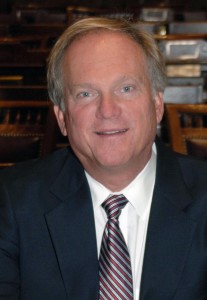By Sen. Lee Hawkins

ATLANTA (Feb. 1, 2010) – The Georgia General Assembly is in the first few weeks of the 2010 Legislative Session, and we are already working to tackle the big issues we’ll face this year. Of course, balancing the state budget will be our most important and difficult task, as state revenues continue to decline and the governor has projected a $1.4 billion shortfall for the Fiscal Year 2010 budget. He’s proposed a $15.5 billion spending plan in state general funds for the remainder of this fiscal year, which ends June 30. Right now, the FY11 budget stands at $16.8 billion.
We also face crucial decisions on how to maintain Georgia’s access to adequate water supplies. Since Judge Magnuson’s ruling last July that Georgia could lose drinking water from Lake Lanier without a compromise between our neighboring states, lawmakers, the governor, and business leaders have been studying ways to solve this issue. Most recently, the Senate Natural Resources and the Environment Committee, of which I am a member, met to receive an update from the governor’s Water Task Force. The governor created this vital task force to assess the cost and gains from the public industry side in water negotiations. Speakers included Nels Peterson, general counsel for Governor Sonny Perdue, John Brock, co-chair of the governor’s Water Contingency Planning Task Force and Chris Clark, commissioner of the Department of Natural Resources.
Peterson outlined Judge Magnuson’s two findings: that Lake Lanier is not an authorized source of water and that the Army Corp of Engineers exceeded their authority by regulating the water flow in Lake Lanier. He concluded that without any changes, our consistent water supply will be detrimentally affected. Brock then gave an extensive presentation on the governor’s call for a four-pronged proposal. The proposal consists of appealing the ruling, tri-state negotiations, congressional reauthorization and a viable contingency plan. He noted that in addition to conservation and good policy, the keys to Georgia’s success are in our ability to Conserve, Capture, and Control. Commissioner Clark concluded with the department’s findings and water management recommendations. He briefly touched on looking to the future for viable solutions that can be put in place by 2015 and 2020. He highlighted the benefits of incentives for energy efficient fixtures, incentives for new construction, and the potential need for legislative mandates. The commissioner reminded the committee that in all efforts, conservation should be a priority and should become a part of the state culture, not just within Metro Atlanta.
We passed the first bill of the session out of the Senate, which allows for the use of hands-free communication devices while driving a vehicle. Few drivers realize that under current law, it is illegal to use a Bluetooth while driving. The current law was originally designed to prohibit the use of headphones, and was enacted before the creation of cell phones, Blackberries, and other communication devices. While these devices would now be legal, the bill states that it is illegal to operate a motor vehicle while wearing a headset or headphone that would impair one’s ability to hear. This bill marks an important step toward making Georgia roads safer for all drivers.
The Senate made history when we formally invited House speaker and former senator David Ralston to the Chamber. He was presented with a resolution honoring his election to the speakership, and was invited to address members at the rostrum. He is the first senator to be elected speaker of the House, as well as the first speaker to be invited to address the Senate Chamber. During his speech, Speaker Ralston pledged a new era in the House that will lead the way to a more open and transparent process that allows all voices to be heard. I look forward to working with our new speaker to serve the citizens of our great state.
Sen. Lee Hawkins serves as the chairman of the State and Local Governmental Operations Committee. He represents the 49th Senate District, which includes Hall County and portions of Jackson County. He may be reached at 404.656.6578 or via e-mail at lee.hawkins@senate.ga.gov.
COLUMN
For Immediate Release:
February 1, 2010
For Information Contact:
Raegan Weber, Director
Kallarin Richards, Senior Communications Specialist
kallarin.richards@senate.ga.gov
404.656.0028